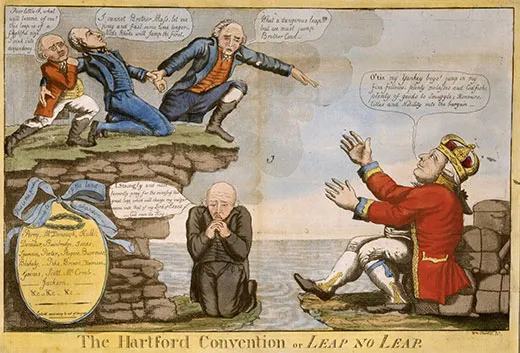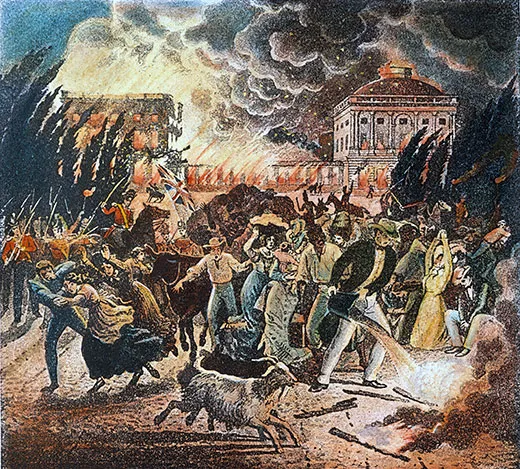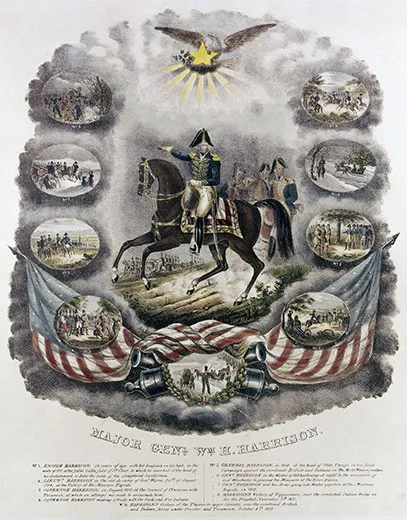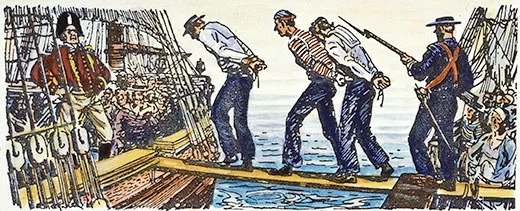Britain Never Again Dared Treaty of Ghent
/https://tf-cmsv2-smithsonianmag-media.s3.amazonaws.com/filer/32/82/32827c55-c567-4508-ae60-8fe37b647fc6/42-24017617-1.jpg)
1. The State of war Needs Re-Branding
"The War of 1812" is an easy handle for students who struggle with dates. Merely the name is a misnomer that makes the conflict sound similar a mere wisp of a war that began and ended the same twelvemonth.
In reality, it lasted 32 months post-obit the U.S. declaration of war on Great britain in June 1812. That's longer than the Mexican-American War, Spanish-American War, and U.South. interest in World War I.
Also confusing is the Boxing of New Orleans, the largest of the state of war and a resounding U.S. victory. The boxing occurred in January, 1815—two weeks after U.S. and British envoys signed a peace treaty in Ghent, Belgium. News traveled slowly and so. Yet, it'due south technically incorrect to say that the Battle of New Orleans was fought after the war, which didn't officially end until February xvi, 1815, when the Senate and President James Madison ratified the peace treaty.
For roughly a century, the conflict didn't merit and so much as a upper-case letter W in its name and was often called "the war of 1812." The British were fifty-fifty more dismissive. They termed it "the American State of war of 1812," to distinguish the conflict from the much great Napoleonic War in progress at the same time.
The War of 1812 may never merit a Tchaikovsky overture, but perhaps a new proper name would aid rescue it from obscurity.
ii. Impressment May Have Been a Trumped-Up Charge
I of the strongest impetuses for declaring war against Smashing Uk was the impressment of American seamen into the Regal Navy, a non uncommon deed among navies at the fourth dimension only 1 that incensed Americans notwithstanding. President James Madison's State Department reported that 6,257 Americans were pressed into service from 1807 through 1812. Only how big a threat was impressment, really?
"The number of cases which are alleged to have occurred, is both extremely erroneous and exaggerated," wrote Massachusetts Sen. James Lloyd, a Federalist and political rival of Madison's. Lloyd argued that the president's allies used impressment as "a theme of party clamour [sic], and party odium," and that those citing every bit a casus belli were "those who accept the least knowledge and the smallest interest in the subject area."
Other New England leaders, specially those with ties to the shipping industry, also doubted the severity of the problem. Timothy Pickering, the Bay State's other senator, deputed a study that counted the total number of impressed seamen from Massachusetts at slightly more than 100 and the total number of Americans at just a few hundred.
Yet the Britons' back up for Native Americans in conflicts with the United States, as well every bit their ain designs on the North American borderland, pushed Southern and Western senators toward war, and they needed more back up to declare it. An issue that could place the immature nation as the aggrieved party could help; of the 19 senators who passed the declaration of state of war, merely three were from New England and none of them were Federalists.
3. The Rockets Really Did Accept Carmine Glare
Francis Scott Key famously saw the American flag flight over Fort McHenry amidst the "rockets' cerise glare" and "bombs bursting in air." He wasn't beingness metaphoric. The rockets were British missiles chosen Congreves and looked a bit like giant bottle rockets. Imagine a long stick that spins around in the air, attached to a cylindrical canister filled with gunpowder, tar and shrapnel. Congreves were inaccurate only intimidating, an 1814 version of "shock and awe." The "bombs bursting in air" were 200 pound cannonballs, designed to explode above their target. The British fired about 1500 bombs and rockets at Fort McHenry from ships in Baltimore Harbor and only succeeded in killing iv of the fort'due south defenders.
iv. Uncle Sam Came From the War Attempt
The Star-Spangled Banner isn't the merely patriotic icon that dates to the State of war of 1812. It'southward believed that "Uncle Sam" does, too. In Troy, New York, a military supplier named Sam Wilson packed meat rations in barrels labeled U.S. According to local lore, a soldier was told the initials stood for "Uncle Sam" Wilson, who was feeding the ground forces. The name endured as shorthand for the U.Southward. regime. Nonetheless, the image of Uncle Sam as a white-bearded recruiter didn't appear for another century, during World War I.
5. The Burning of Washington was Capital Payback
To Americans, the called-for of Washington past British troops was a shocking deed by barbaric invaders. Merely the called-for was payback for a similar torching by American forces the year earlier. Later defeating British troops at York (today's Toronto), and then the capital of Upper Canada, U.S. soldiers plundered the town and burned its parliament. The British exacted revenge in Aug. 1814 when they burned the White House, Congress, and other buildings.
Long-term, this may have been a approving for the U.S. capital. The flammable "President's House" (as it was and so known) was rebuilt in sturdier form, with elegant furnishings and white paint replacing the before whitewash. The books burned at Congress'southward library were replaced by Thomas Jefferson, whose wide-ranging collection became the foundation for today's comprehensive Library of Congress.
6. Native Americans Were the War'south Biggest Losers
The United States declared state of war over what it saw as British violations of American sovereignty at sea. But the state of war resulted in a tremendous loss of Native American sovereignty, on land. Much of the combat occurred along the frontier, where Andrew Jackson battled Creeks in the South and William Henry Harrison fought Indians allied with the British in the "Old Northwest." This culminated in the killing of the Shawnee warrior, Tecumseh, who had led pan-Indian resistance to American expansion. His death, other losses during the war, and U.k.'southward abandonment of their native allies after it, destroyed Indians' defense of their lands eastward of the Mississippi, opening the fashion for waves of American settlers and "Indian Removal" to the west.
7. The Ill-Fated General Custer Had His Start in the State of war
In 1813, by the River Raisin in Michigan, the British and their Native American allies dealt the U.Due south. its about stinging defeat in the State of war of 1812, and the battle was followed past an Indian attack on wounded prisoners. This incident sparked an American battle cry, "Remember the Raisin!"
William Henry Harrison, who later led the U.S. to victory in boxing confronting the British and Indians, is remembered on his tomb equally "Avenger of the Massacre of the River Raisin."
George Armstrong Custer remembered the Raisin, too. He spent much of his youth in Monroe, the city that grew upwardly forth the Raisin, and in 1871, he was photographed with State of war of 1812 veterans beside a monument to Americans slaughtered during and after the boxing. Five years later, Custer also died fighting Indians, in one of the most lopsided defeats for U.S. forces since the River Raisin battle 63 years earlier.
8. At that place Was Nigh a United states of america of New England
The political tension persisted every bit the war progressed, culminating with the Hartford Convention, a meeting of New England dissidents who seriously flirted with the idea of seceding from the United states. They rarely used the terms "secession" or "disunion," notwithstanding, as they viewed information technology every bit merely a separation of two sovereign states.
For much of the preceding 15 years, Federalist plans for disunion ebbed and flowed with their political party's political fortunes. Subsequently their rival Thomas Jefferson won the presidency in 1800, they grumbled sporadically about seceding, but mostly when Jefferson took actions they didn't appreciate (and, worse, when the electorate agreed with him). The Louisiana Purchase, they protested, was unconstitutional; the Embargo Act of 1807, they said, devastated the New England shipping industry. Electoral victories in 1808 silenced chatter of disunion, but the War of 1812 reignited those passions.
Led by Senator Thomas Pickering, disaffected politicians sent delegates to Hartford in 1814 as the outset step in a serial to sever ties with the United States. "I do not believe in the practicality of a long-continual marriage," wrote Pickering to convention chairman George Cabot. The North and South'southward "mutual wants would render a friendly and commercial intercourse inevitable."
Cabot and other moderates in the political party, however, quashed the secessionist sentiment. Their dissatisfaction with "Mr. Madison's War," they believed, was simply a consequence of belonging to a federation of states. Cabot wrote back to Pickering: "I greatly fear that a separation would be no remedybecause the source of them is in the political theories of our state and in ourselves.... I concord commonwealth in its natural operation to bethe government of the worst."
nine. Canadians Know More About the War Than Yous Exercise
Few Americans gloat the State of war of 1812, or recall the fact that the U.S. invaded its northern neighbour 3 times in the class of the disharmonize. But the same isn't true in Canada, where retentiveness of the war and pride in its outcome runs deep.
In 1812, American "State of war Hawks" believed the conquest of what is today Ontario would exist easy, and that settlers in the British-held territory would gladly go office of the U.S. Merely each of the American invasions was repelled. Canadians regard the war every bit a heroic defense against their much larger neighbor, and a formative moment in their country'due south emergence every bit an independent nation. While the War of 1812 bicentennial is a muted affair in the U.S., Canada is reveling in the anniversary and celebrating heroes such every bit Isaac Brock and Laura Secord, footling known south of the edge.
"Every time Canada beats the Americans in hockey, everybody's tremendously pleased," says Canadian historian Allan Greer. "It'due south similar the big brother, you lot have to savor your few victories over him and this was 1."
After nearly a century of obscurity equally a farmer in New York Land, he became something of a celebrity the closer he came to dying. Stories about his life filled paper columns, and the New York City Board of Aldermen began planning Cronk'southward funeral months before he died.
When he did, they marked the consequence with due ceremony. "As the funeral cortege moved from the K Central Station to the City Hall it afforded an imposing and unusual spectacle," reported theEvening Press of Grand Rapids, Michigan. "Led by a police escort of mounted officers, a disengagement from the United States regular Army, the Lodge of 1812 and the Old Baby-sit in uniform, came the hearse bearing the old warrior's body. Around it, in hollow foursquare formation, marched the members of the U.S. Grant Post, G.A.R. Then followed the Washington Continental Guard from Washington, D.C., the Army and Navy Spousal relationship, and carriages with members of the Cronk family unit. Carriages with Mayor McClellan and members of the city government brought up the rear."
silversteinhishat.blogspot.com
Source: https://www.smithsonianmag.com/history/the-10-things-you-didnt-know-about-the-war-of-1812-102320130/




Post a Comment for "Britain Never Again Dared Treaty of Ghent"